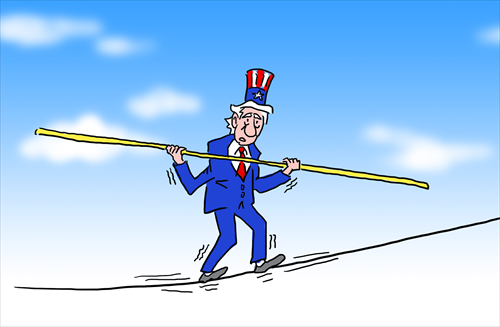HOME >> OP-ED
Political correctness eases ethnic tensions in US
By Rong Xiaoqing Source:Global Times Published: 2016/7/22 0:14:42

Illustration: Liu Rui/GT
I used to feel suffocated by political correctness in the US. But hear me now: if Donald Trump becomes the President of the US, there will soon be nostalgia in the US calling for its return. Human nature often means we miss anything that is taken away. And in this case, we have been warned what will replace our PC world. Trump has told us himself with his ugly and inflammatory comments about women, Mexicans and Muslims.In a recent piece in the New York Times about the impact of derogatory comments toward women on Wall Street, former trader Sam Polk writes, "When we dehumanize people in conversation, we give permission for them to be degraded in other ways as well." That does not only apply to women.
The US can be tense enough even when political correctness is part of the prevailing backdrop. Take the worsening racial tensions in the country. The increasing heat between the police and minorities, including the horrible shootings of police by black gunmen in the past couple of weeks, is largely considered as a black and white issue. Asians, morally indifferent to what's going on in other communities than their own, had been largely silent on the question until a Chinese cop named Peter Liang accidentally shot dead an unarmed and innocent black man Akai Gurley in Brooklyn at the end of 2014.
Liang was indicted and then convicted for manslaughter. During the one year or so that he was awaiting his fate from the court, the tension between the Chinese and the black communities escalated. The Chinese believed Liang became a scapegoat for some previous incidents in which white cops avoided prosecution after causing the death of black civilians.
The Chinese community in New York held two rallies that drew thousands of participants to protest against Liang's indictment and conviction. At the second rally, which was held on February 20, members of the Black Lives Matter movement exchanged heated words with the Chinese protesters.
The atmosphere was even worse in the Spring Festival before Liang's sentencing. Charles Barron, a radical black activist and State Assemblyman warned of a riot if the black community didn't see Liang severely punished. And some Chinese community leaders called for Chinese restaurants in New York to close on the day when Liang was sentenced to avoid possible harassment by black people - surely an over-reaction by those leaders as it only served to add to the tensions.
During these events, there were also voices from within the Chinese community calling for people to be more sensitive to the anger from the black community and to try to understand the pain it was suffering from the loss of an innocent life.
On March 28, the Asian American Business Development Center and One Hundred Black Men, civic organizations from each community, held a forum entitled "Race Relations and Collaboration between Asian American and African American Communities After the Peter Liang Case." Everyone who spoke, politicians and activists alike, emphasized the importance of mutual understanding, and called for people in both communities to not only focus on an individual case, but also to explore the issues on which they can work together in the long run.
I remember sitting there and thinking, "This may be the only politically correct thing to say at this moment, and everyone knows it is right, but how will these beautiful words help to solve the imminent clash?"
But surprisingly, on April 19, the day when Liang was sentenced to five years' probation and 800 hours of community service rather than imprisonment, there were no shut restaurants and there was no riot. I cannot find any other explanation than that the politically correct words may have found a ready audience.
In the latest wave of police and community conflicts when two black men, Alton Sterling in Louisiana and Philando Castile in Minnesota were shot dead by the police and then five cops in Dallas were shot dead and three more murdered in Baton Rouge by black gunmen, President Barack Obama hasn't hidden his frustration over the powerlessness of words.
"I see how easily we slip back into our old notions, because they're comfortable, we're used to them. I've seen how inadequate words can be in bringing about lasting change," he said at a service for the five fallen police officers in Dallas.
But at least in the Asian community, I see the contrary - the long lasting effects of words. Hundreds of young Asian-Americans organized via the Internet and drafted an open letter to the older people in Asian families to explain to them what happened to Castile and Sterling and why they should care about the Black Lives Matter movement. Conversations have been ignited in many Asian families. And at least one community organization in Chinatown is planning to host another forum to call for Asians to stand with black people to fight for justice.
Maybe the Chinese community as a whole still doesn't show great empathy to the sufferings outside of its racial boundaries. But clearly more and more people have realized this needs to be changed. This is the power of political correctness. It may not be able to bring dramatic changes overnight, but gradually it can sometimes pull the world in the right direction.
The author is a New York-based journalist. rong_xiaoqing@hotmail.com
Posted in: Viewpoint